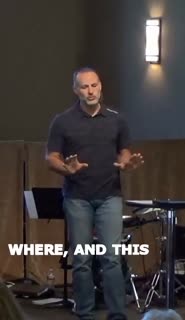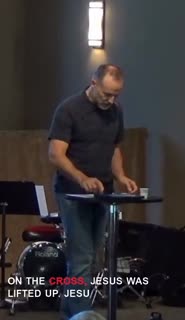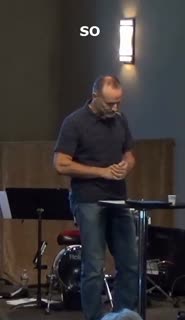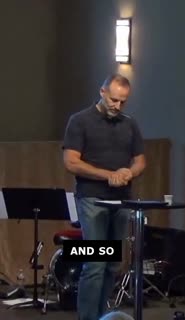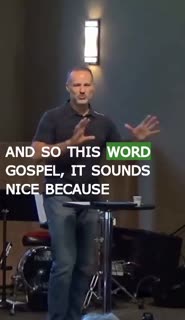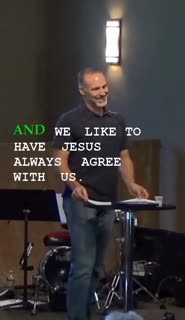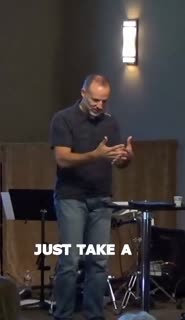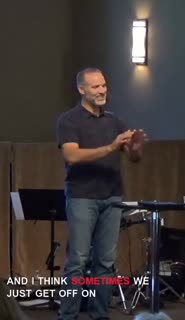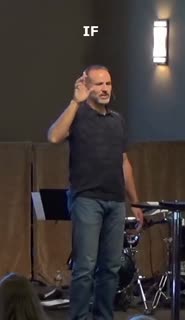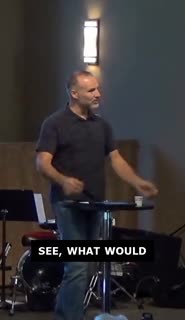Reigning with Christ: Our Call to Kingdom Living
Devotional
Sermon Summary
Bible Study Guide
Sermon Clips
1) "In a world where, and this is what I was testing out with my friends last night who are not Jesus followers and certainly not conservative in any way. In a time where we've said no to spirituality or no to spiritual things or no to these different religions, we have this vacuum. That needs to be filled. Like, where were the ultimate things come from? And so people are playing at politics like it's the ultimate thing. It's become a religious fervor sort of thing. You've seen this or experienced it. The kind of fervor and excitement and passion and shame on you and all of that that we used to apparently do in religion is now like in politics." [04:43] (48 seconds)
2) "On the cross, Jesus was lifted up. Jesu Nazarenes, Rexu the Oram. Jesus, the Nazarene, King of the Jews. Very symbolically, he's like, I will be lifted up. And draw all men to myself. Somehow, all the scripture, the gospels that we have declare that on the cross, he was pronounced king. And in his resurrection and in his ascension, he now sits at the right hand of the throne of God. Where, scandalously, we are somehow seated with him as says scripture. This is very interesting. And as Jesus takes his throne and as he is King Jesus, his Lord of all. That's a, that's a very political thing to say." [09:10] (49 seconds)
3) "So the word evangelion or evangel, we'll just try to say that, like our word evangelism, is a royal proclamation that something is completely different about your world. Everything is shifted. Everything is reorganized. It's a big, big announcement. And it might be that the blessed defeat of your armies, which kept you in, you know, pagan or whatever superstition or whatever. Your armies have been defeated now. And Caesar has acquired your territory. And isn't that a good thing? You kind of have to cheer, don't you? Like, yay, Caesar. Okay. Yay, it's good." [12:53] (43 seconds)
4) "And so throughout the Roman Empire, you'd find inscriptions in different places that taught people what to believe about their rulers. They would call the emperors things like manifest God, universal savior, God from God, savior and benefactor, the lord of the whole world. So Julius Caesar was called manifest God, universal savior. Augustus was God from God. Even Nero, known for his cruelty, was described as the good God of the inhabited world, which is so thankful." [13:36] (32 seconds)
5) "And so this word gospel, it sounds nice because it's gospel. If we look at the English, it means it's a good spell or a good word, a good message. That comes out and that's true. And so we talk about the benefits of the gospel all the time. Well, forgiveness of sin, reconciliation with God. We have a future that's secured. We have all these these benefits that add onto it. And this seems to be the central deco this is what Paul says. This is, this is the gospel which promised beforehand through his profits in the holy scripture concerning his son who has descended from the king." [16:28] (40 seconds)
6) "And we like to have Jesus always agree with us. Don't we like that? Jesus, I know, man, those people, what's wrong with them? I know, yeah, I know, that's what I was saying. What's wrong with them? And we've buddied up with Jesus to a point where he thinks exactly like us, magically, because he probably doesn't, right? I was talking to my friends about that last night. Like, part of the problem of thinking Jesus is always on our side is that we always think he agrees with us and doesn't have a word to say to us." [33:41] (34 seconds)
7) "And so you can just take a bite out of it and just say, I guess that's the story on there. guess that's it. I'm called to be saint. And because of the declaration of the gospel, I'm called to be a holy one. And I'm given access to the Father so I can speak a word for my brother and my sister. I can approach the throne room and receive grace and mercy in my time of need. I have access. I'm seated with Christ in the heavenlies. And this is the story that I'm in." [39:52] (31 seconds)
8) "And I think sometimes we just get off on our stories. And we start thinking that I am supposed to make all this happen. I am supposed to figure this out. I am supposed to declare my purpose and manifest it to the world. And I'm supposed to do this. And I'm supposed to figure all these things out. And Jesus is like, no, we got all that figured out. It's all settled, actually. Jesus, the Christ, is Lord. The glory of God the Father and grace and peace flows down to you." [40:24] (22 seconds)
9) "And if so, then the way we live together, the way we encourage one another, the way we say, hey, can we go grab coffee? Can we go talk about, I'd love to walk with you through that journey. The way we do this life together, some of you are experiencing it, so I'm just cheering that on. But the way that we live together is going to shift. If you look around the room, go ahead and look around the room. If that person across the way has declared their allegiance to Jesus, has said, I want his blood to cleanse me, then these are the people that we'll be ruling and reigning with in the new creation that God brings." [41:41] (39 seconds)
10) "And then let's see, what would it look like? And some of the best ideas are out there, people. Our job as elders in this church, anybody with a gift is called to equip the saints to do the work of ministry. I'm not the idea factor, but we do know the one who does know. What should we do in this city, in this time? How do we be a people? It's an oasis for God. We're holy ones, we're going to say. We're called to be holy ones. Like, I'm no saint. You're like, tell Jesus that. And he'll confront you and say, do you pledge your allegiance to me? Oh, yeah. Then you're a holy one." [45:27] (35 seconds)
Ask a question about this sermon
2) "On the cross, Jesus was lifted up. Jesu Nazarenes, Rexu the Oram. Jesus, the Nazarene, King of the Jews. Very symbolically, he's like, I will be lifted up. And draw all men to myself. Somehow, all the scripture, the gospels that we have declare that on the cross, he was pronounced king. And in his resurrection and in his ascension, he now sits at the right hand of the throne of God. Where, scandalously, we are somehow seated with him as says scripture. This is very interesting. And as Jesus takes his throne and as he is King Jesus, his Lord of all. That's a, that's a very political thing to say." [09:10] (49 seconds)
3) "So the word evangelion or evangel, we'll just try to say that, like our word evangelism, is a royal proclamation that something is completely different about your world. Everything is shifted. Everything is reorganized. It's a big, big announcement. And it might be that the blessed defeat of your armies, which kept you in, you know, pagan or whatever superstition or whatever. Your armies have been defeated now. And Caesar has acquired your territory. And isn't that a good thing? You kind of have to cheer, don't you? Like, yay, Caesar. Okay. Yay, it's good." [12:53] (43 seconds)
4) "And so throughout the Roman Empire, you'd find inscriptions in different places that taught people what to believe about their rulers. They would call the emperors things like manifest God, universal savior, God from God, savior and benefactor, the lord of the whole world. So Julius Caesar was called manifest God, universal savior. Augustus was God from God. Even Nero, known for his cruelty, was described as the good God of the inhabited world, which is so thankful." [13:36] (32 seconds)
5) "And so this word gospel, it sounds nice because it's gospel. If we look at the English, it means it's a good spell or a good word, a good message. That comes out and that's true. And so we talk about the benefits of the gospel all the time. Well, forgiveness of sin, reconciliation with God. We have a future that's secured. We have all these these benefits that add onto it. And this seems to be the central deco this is what Paul says. This is, this is the gospel which promised beforehand through his profits in the holy scripture concerning his son who has descended from the king." [16:28] (40 seconds)
6) "And we like to have Jesus always agree with us. Don't we like that? Jesus, I know, man, those people, what's wrong with them? I know, yeah, I know, that's what I was saying. What's wrong with them? And we've buddied up with Jesus to a point where he thinks exactly like us, magically, because he probably doesn't, right? I was talking to my friends about that last night. Like, part of the problem of thinking Jesus is always on our side is that we always think he agrees with us and doesn't have a word to say to us." [33:41] (34 seconds)
7) "And so you can just take a bite out of it and just say, I guess that's the story on there. guess that's it. I'm called to be saint. And because of the declaration of the gospel, I'm called to be a holy one. And I'm given access to the Father so I can speak a word for my brother and my sister. I can approach the throne room and receive grace and mercy in my time of need. I have access. I'm seated with Christ in the heavenlies. And this is the story that I'm in." [39:52] (31 seconds)
8) "And I think sometimes we just get off on our stories. And we start thinking that I am supposed to make all this happen. I am supposed to figure this out. I am supposed to declare my purpose and manifest it to the world. And I'm supposed to do this. And I'm supposed to figure all these things out. And Jesus is like, no, we got all that figured out. It's all settled, actually. Jesus, the Christ, is Lord. The glory of God the Father and grace and peace flows down to you." [40:24] (22 seconds)
9) "And if so, then the way we live together, the way we encourage one another, the way we say, hey, can we go grab coffee? Can we go talk about, I'd love to walk with you through that journey. The way we do this life together, some of you are experiencing it, so I'm just cheering that on. But the way that we live together is going to shift. If you look around the room, go ahead and look around the room. If that person across the way has declared their allegiance to Jesus, has said, I want his blood to cleanse me, then these are the people that we'll be ruling and reigning with in the new creation that God brings." [41:41] (39 seconds)
10) "And then let's see, what would it look like? And some of the best ideas are out there, people. Our job as elders in this church, anybody with a gift is called to equip the saints to do the work of ministry. I'm not the idea factor, but we do know the one who does know. What should we do in this city, in this time? How do we be a people? It's an oasis for God. We're holy ones, we're going to say. We're called to be holy ones. Like, I'm no saint. You're like, tell Jesus that. And he'll confront you and say, do you pledge your allegiance to me? Oh, yeah. Then you're a holy one." [45:27] (35 seconds)
